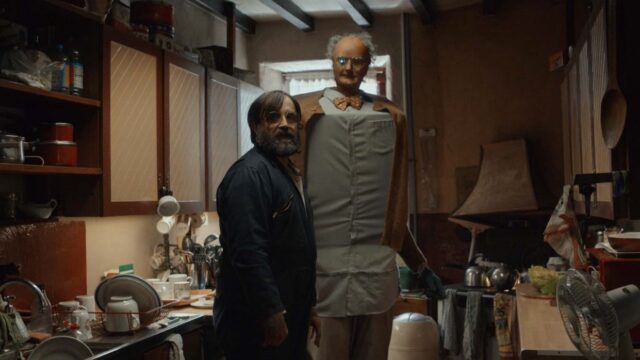Brian and Charles: Rusty, by David Bax

It’s hard to say whether or not Jim Archer‘s Brian and Charles would be any better if it didn’t take the form of a mockumentary. On the one hand, that’s a tired comic conceit from which it would seem every humorous possibility has long since been wrung. So you’d think it would have to be better. On the other hand, the fake documentary format is often used to paper over filmmaking shortcomings, providing the simplest possible box to put the jokes and story into, kind of like the coffee can into which Walter and the Dude put Donny’s ashes. So maybe the movie would be worse for having to depend on more considered, intentional construction. To be fair, there is one interesting wrinkle to the method; it’s fun to ask yourself whether the people Brian (David Earl) encounters are reacting in surprise to Charles the seven-foot robot or to the fact that a camera crew is following the local recluse around.
Brian is not the first character of this sort Earl has portrayed. In fact, Brian has quite a bit in common with the role Earl played on the little-seen (and not without reason) Ricky Gervais series After Life. Both are eccentrics whose gruff voices and large, hirsute bodies hide a deeply wounded, insecure and often childlike psyche. Despite the shortcomings of both projects (to be clear, Brian and Charles is nowhere near as bad as After Life), Earl’s performances are surprisingly complex and consistently quite funny. This time around, the laughs often arise when Brian’s awe at the advanced robot he’s accidentally built crashes up against his lack of the intellectual capacity or vocabulary to express it. When confronted with evidence that Charles possesses a rapidly developing artificial intelligence, all Brian can think to say is, “He’s ahead of the game, isn’t he?”
Possibly even more impressive is the performance of Chris Hayward as Charles. It’s got to be difficult to emote from within a giant metal box with a mannequin’s head on top. But, through stature, physical movements and voice-modulated line readings, we come to know how Charles feels, from cautious to haughty to bizarrely curious; “Can birds do what they like?” he asks Brian.
Of course, Brian’s perspective on the world is just as skewed in its own way. This is how Brian and Charles comes to fulfill the buddy comedy promise of its title. The strokes are broad, to be sure, but there’s something undeniably touching about the friendship these two oddballs develop based on little else than both of them just being oddballs.
But Archer, Earl and Hayward (the latter two of whom wrote the screenplay) clearly feel some obligation to build conventional plot structures around this central relationship. In fact, it sometimes feels as if they’ve done so under protest. Thus we get a stock villain (Jamie Michie) in the local bully and a stock love interest (Louise Brealey) in the shy girl whose appliances Brian repairs. Both actors rise to the occasion but it’s still all padding. Brian and Charles feels like what it is; a short film overextended to feature length.





























